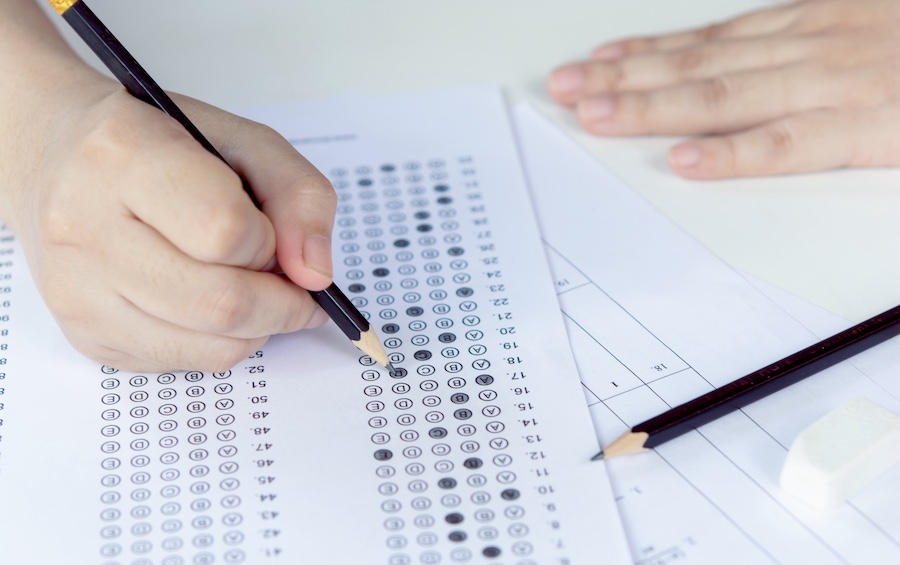Your standardized test scores are a major component of how colleges evaluate your academic preparation for the work you will be doing there. This is especially true as many top colleges end their test optional policies, and return to requiring all students submit standardized test scores.
Of course, not all colleges have the same policies when it comes to how you need to submit your scores. We’ve discussed the differences in how score choice and superscoring work before, and how these impact how often you should take standardized tests. In this article, we’re going to lay out which top colleges allow for score choice, and which have more restrictive testing policies.
What is Score Choice Anyway?
Score choice is the practice of allowing you to decide which of your test scores to submit to a college. Colleges that allow for score choice allow you to submit scores from only some of your sittings from the SAT or ACT; thus if you did poorly on one sitting, you don’t need to send it in. Schools which do not allow score choice require you to send in scores from all your sittings of a test.
Superscoring is the practice of taking your highest score on different sections from different sittings of a test and adding them together to make a single higher score. This allows colleges to see you in the best possible light (and also gives them more leeway to brag about how high their average test scores are).
We explain both of these practices in more depth in our article here.
Which Colleges Use Score Choice and Superscoring?
So that’s what the policies are, but where are they put into practice? In the following table, we list the testing policies of top colleges for score choice and superscoring, and any notes on how their testing policies have their own eccentricities.
| University | Allows Score Choice? | Allows Superscoring? | Notes |
| Boston College | Yes | Yes | Currently test optional |
| Boston University | Yes | Yes | They allow score choice, but recommend submitting all scores anyway |
| Brandeis | Yes | Yes | Test optional |
| Brown | Yes | Yes | |
| Caltech | No | Yes | |
| Carnegie Mellon | Yes | Yes | Currently test optional, moving to test flexible next year (and test required for CS students) |
| Case Western | Yes | Yes | Test optional |
| Columbia | Yes | Yes | |
| Cornell | Yes | Yes | They are test optional this year, but recommend submitting scores, and sending in scores from all sittings |
| Dartmouth | Yes | Yes | |
| Duke | Yes | Yes | |
| Emory | Yes | Yes | Currently test optional |
| Georgetown | No | Yes | They are not on the Common App |
| Georgia Tech | Yes | Yes | |
| Harvard | Yes | No | |
| Johns Hopkins | Yes | Yes | |
| MIT | No | Yes | They request you submit scores from every sitting you have |
| NYU | Yes | Yes | Currently test optional |
| Northwestern | Yes | Yes | Currently test optional |
| Notre Dame | Yes | Yes | Currently test optional |
| Princeton | Yes | Yes | While they accept score choice, they recommend submitting all scores. They are currently test optional |
| Rice | Yes | Yes | Rice is test recommended, but does not require you to submit scores |
| Stanford | Yes | Yes | Currently test optional |
| Tufts | Yes | Yes | Currently test optional |
| UChicago | Yes | Yes | Entirely test optional, submitted test scores will only be considered if they help your application |
| University of Florida | No | Yes | UF also accepts the Classical Learning Test, which most schools do not |
| University of Michigan | No | No | Currently test optional |
| UNC Chapel Hill | Yes | Yes | Students with a GPA below 2.8 must submit test scores, they are otherwise test optional |
| UPenn | No | Yes, but not between digital and paper SAT | Currently test optional |
| USC | Yes | Yes | Currently test optional |
| UT Austin | Yes | No | |
| University of Virginia | Yes | Yes | Currently test optional |
| Vanderbilt | No | Yes | Currently test optional |
| Wake Forest | No | Yes | Test optional |
| WashU | Yes | Yes | Currently test optional |
| Yale | Yes | Yes | Require tests, but will accept AP tests in place of the ACT or SAT |
Note that most schools will do score choice within the context of a test; with the introduction of the new digital SAT, many schools will not superscore across versions of the test. Thus if you take the digital SAT twice they will superscore, but if you take the paper version once and the digital version once, they will not.
Note also that many schools are currently test optional, but some of these have these policies on a deadline, while others have decided to continue them indefinitely. We cover this more in our article on the end of test optional admissions.
Finally, UC system schools do not allow for the submission of standardized test scores, so none of them are included on this table.
How Should Score Choice Impact Your Application?
Score choice works on both the Common App when reporting scores yourself, and when sending scores to universities. Almost all colleges allow for self-reported scores, and only require full score reports if you have been admitted. Discrepancies between self reports and your official scores can result in acceptances being rescinded.
Due to differences in policy, we recommend adding all of your test scores to the Common App to begin with, then reviewing which universities have what requirements for score reporting. This is a nuisance, especially as universities continue to diversify how they handle standardized tests, and whether or not a school is test optional can shift year to year.
How you apply in this context depends entirely on the scores you achieve on the SAT and ACT. If you have one or two really excellent sittings, and one or two really poor ones, then a school which allows score choice allows you to portray the best side of yourself. If you have a couple of mixed sittings, then a school which superscores allows you to put your best foot forward. If you aren’t the best at standardized testing, then a school which makes including those scores optional may be the best choice for you.
In every circumstance, you want to find and apply to schools that allow you to portray yourself in the best possible light, and show off your achievements and capabilities. Test scores allow for the most variability in this, because colleges have such disparate policies in how they handle them.
Final Thoughts
Standardized tests are an ever-present part of college admissions, even after the brief stint of near universal test optional practices during the Covid pandemic. Their universal nature comes with a lot of nuance however, as each university adopts its own policies it thinks are best, and students are caught in the middle of a significant number of competing and contradictory requirements.
We hope that this article has explained what these requirements entail at a number of top universities, and how they impact you when you are trying to apply. Of course, the first step is absolutely acing the standardized tests when you take them. For advice on preparing for the standardized tests, or help maximizing your score, our test prep service is for you. We help students increase their scores on the SAT by 180 points on average. To learn more about how we can help you ace these tests, schedule a free consultation with us today. We’re always happy to hear from you.








